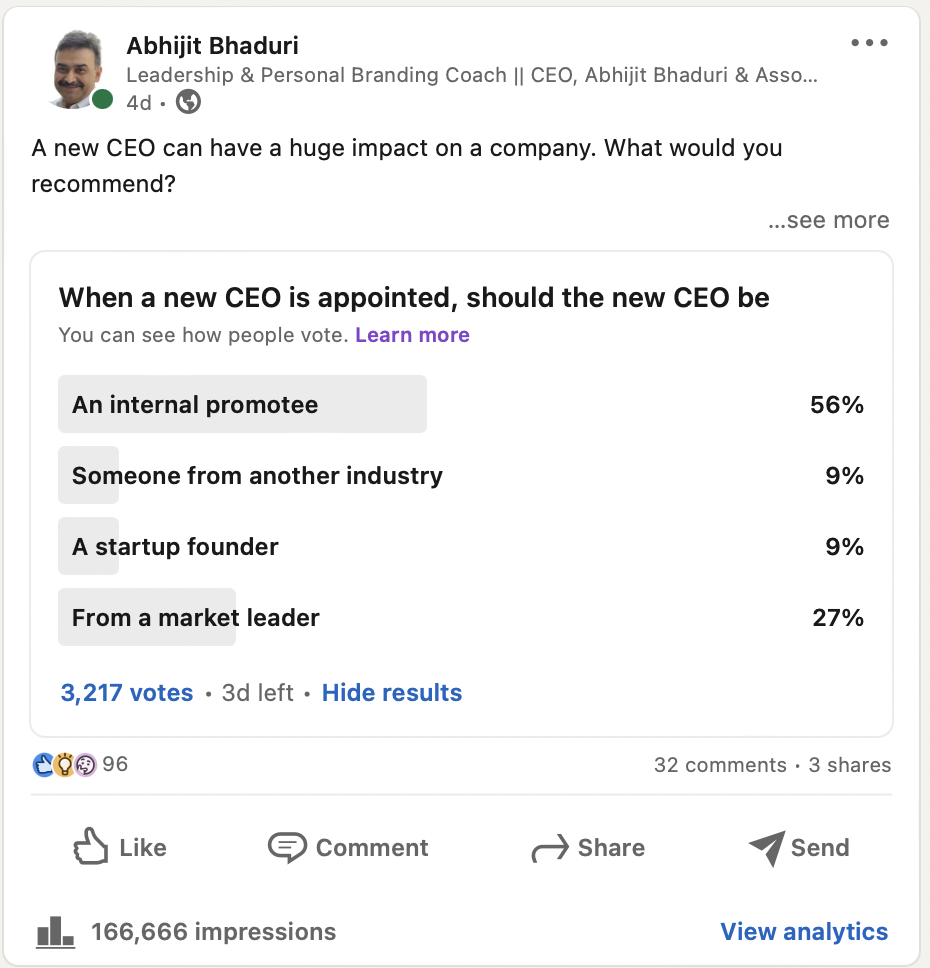Look for this when you HIRE - stop thinking in terms of internal candidates or external
The CEOs of the future will all be Relationship Workers. Technology will help track petabytes of data being generated by the firm and the customers and employees. The CEO's skill will be tested in how well he/she is able to navigate the complex web of stakeholder relationships.
The choice during a leadership change
A change in leadership is a great opportunity for the organization to rethink its strategy for the future. Is an internal candidate better placed to take the company into the future? Should the leadership be handed to a startup founder or someone from another industry? Would hiring from a market leader be the best choice today? More than 3200 readers responded (thank you). 56% voters wanted an internal candidate.
To vote, click this link
Is an internal candidate always better
When the market dynamics are in a state of flux, the organization has to adapt and change. That can be done by either an internal candidate or an external hire. Whether the candidate is an external hire or an internal candidate, the role has two large components:
Creating a strategy and the roadmap - these are skills that all knowledge workers have. They have to analyse the data, find patterns, make choices and craft the vision of the journey. Once created this needs to be updated and tweaked to reflect changes in the marketplace.
Inspiring, motivating, coaching and building strong teams to execute the plan - these are all skills we need as we work with others. These are the skills every people manager needs to be assessed against.
"War-time CEO vs Peace-time CEO model" needs to be revisited
Ben Horowitz of a16z wrote a much quoted piece in 2011 about two models of CEOs. The choice of the CEO he argued, depends on whether there is war or peace.
"Peacetime CEO builds scalable, high volume recruiting machines. Wartime CEO does that, but also builds HR organizations that can execute layoffs." - Ben Horowitz
Like in war, when a company's survival is under threat, a CEO has to take tough calls with the information changing constantly. Startups often need war-time CEOs when the funds are drying up and the product is still trying to find the buyer. Dreamers and Unicorns both need war time CEOs.
Peacetime in business means those times when a company's competitive advantage is helping its growth. Market Shapers need peacetime CEOs was his argument. <read more>
Stop thinking about war-time and peace time candidates
There is a fundamental shift in the way we have to work. Building trust, understanding emotions and mental health issues are part of the workplace conversations.
Being able to build connections matters more than being the greatest data analyst in the world. Whether during war or peace, the leader needs to navigate emotions much more than data.
Connections come from authenticity <don't miss the 5th most watched TED talk>
We need to be self-aware and regulate our emotions. We also need to be aware of the emotions of others around and respond accordingly. Machines can give you analysis of millions of data points. Do we respond with fear or do we respond with hope depends on our ability to manage emotions.
Evaluate new hires against these five skills
We have to stop thinking in terms of external candidate or internal. Instead we have to hire people who build relationships by influencing, coaching, inspiring and managing conflicts. Great leaders build great teams.
Computers and automation saw the rise of the “knowledge worker”. A knowledge worker was a person whose job involved handling or using information. Work is increasingly becoming so complex that diverse, multi-disciplinary teams are becoming vital. Even the most brilliant people need others to succeed. Building trust is the first step in creating a relationship.
With computers increasingly taking over such jobs, those who are skilled in working with people will become more prized. The future belongs to people who are more emotionally intelligent.
This may be the era of the “relationship worker” – someone who can handle complex human relationships. That involves building awareness of others emotions as well as deep understanding of our own triggers and motivators. Eventually relationship workers will replace knowledge workers because machines are way better than humans at it. <here's a must read>
If you like my newsletter, do share it and encourage at least one friend to subscribe to it. Thanks for being a relationship worker.








